FOR IMMEDIATE RELEASE
Contact: press@takebackthecourt.today
STOLEN SUPREME COURT’S RIGHT-WING JUSTICES HAVE REPEATEDLY FAILED TO RECUSE
SAN FRANCISCO, CA (October 31, 2022) — Today, the Supreme Court will hear arguments in Students for Fair Admissions v. Harvard, one of two cases this term in which the Court is poised to strike down the use of affirmative action policies that have promoted education access and diversity. To avoid even the appearance of conflict, Justice Ketanji Brown Jackson — having sat on the university’s board of overseers until this spring — recused herself from this case. Justice Clarence Thomas, however, failed to recuse himself from this same case, despite his wife’s role on the advisory board of the National Association of Scholars: an organization that filed amicus briefs before the Court supporting Students for Fair Admissions’ challenge.
Take Back the Court released the following statement on behalf of its executive director, Sarah Lipton-Lubet, in response:
“Justice Thomas is poised to add yet another blight to his long list of ethics violations and conflicts of interest, and it’s no surprise — he and his fellow right-wing justices have time and again failed to adhere to widely accepted ethical norms and standards. Why would he break the pattern now?” asked Take Back the Court Executive Director Sarah Lipton-Lubet. “We cannot allow the Court’s right-wing bloc to continue abusing its power with impunity to strip away our most fundamental rights and freedoms. We must expand and rebalance the Court immediately so we can stop the justices’ corrupt power-trip in its tracks once and for all.”
Indeed, Court’s right-wing justices have consistently failed to recuse themselves from cases where they may have conflicts of interest or where the appearance of a conflict of interest is plausible to the public. It’s just one more way in which the stolen conservative majority has chipped away at the Court’s integrity and legitimacy.
Some of the most egregious recent examples of the justices failing to recuse themselves include:
UNDERMINING DEMOCRACY: Justice Thomas’ wife Ginni Thomas had a troubling role in the leadup to the January 6th insurrection. She was in constant communication with White House Chief of Staff Mark Meadows, encouraging Donald Trump’s efforts to overturn the election in the two months before the deadly Capitol riot and demanding Meadows not let Trump concede the election. In the meantime, Thomas was the sole justice who voted to stonewall transparency on matters of the insurrection and efforts to overturn the 2020 election in Trump v. Thompson. The Court ruled that the House Select Committee investigating the January 6 attack was entitled to access to key Trump administration documents. Thomas was the lone dissenter — and provided no reason or justification for siding with Donald Trump.
FAILING TO DISCLOSE FINANCIAL INTERESTS: In 2017 and 2018, Justice Thomas failed to disclose more than $200,000 in consulting fees his wife Ginni Thomas’ consulting firm took from the Center For Security Policy, in violation of Supreme Court annual financial disclosure requirements. In 2018, the Center’s President Frank Gaffney filed an amicus brief with the Court in Trump v. Hawaii in support of the Trump administration’s Muslim ban. Justice Thomas later voted to uphold the xenophobic policy in June 2018.
APPEARANCE OF OUTSIDE INFLUENCE: On October 29, 2019, Brian Brown, the president of the National Organization for Marriage (NOM), posted on Twitter a photograph of himself standing next to Justices Alito and Kavanaugh in what appeared to be a private meeting at the Supreme Court. NOM filed amicus briefs in three cases pending before the Court — Bostock v. Clayton County, Altitude Express v. Zarda, and R.G. & G.R. Harris Funeral Homes v. EEOC. Nonetheless, Kavanaugh and Alito did not recuse themselves from these cases — despite the obvious appearance of improper influence.
JUST PLAIN HYPOCRISY: In 1998, Barrett wrote in a Marquette Law Review piece that due to the conflicting constraints Catholic judges face from their professional oaths and their churches’ teachings, they are “morally precluded from enforcing the death penalty.” In Barrett’s view, if a judge cannot rule in good conscience for the death penalty, that judge should recuse themself from the case. In the same work, Barrett argues for the absolute immorality of abortion. By Barrett’s logic, then, she should have recused herself from Dobbs v. Jackson Women’s Health Organization, where she would ultimately vote with the conservative majority to overturn the fundamental right to abortion. By Barrett’s own standards, the way to avoid violating her oath of office would have been to recuse. Yet she did not.
###
Take Back the Court raises awareness about the urgent need to expand the number of seats on the Supreme Court to address the theft of the court by Senator Mitch McConnell during the Obama Administration. Without adding seats, Congress will not be able to restore the right to vote, ensure reproductive freedom, protect workers, halt our climate emergency, or pass new legislation. Court expansion, which can be accomplished without a constitutional amendment, is the only reform that enables the un-rigging of the system and the restoration of democracy. Learn more: https://www.takebackthecourt.today/
